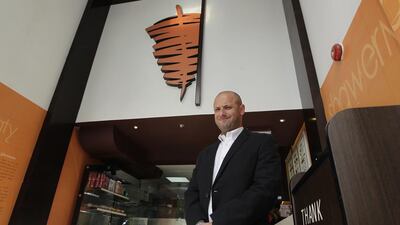Starting a chain of shawarma restaurants in the UAE, at first glance, may make as much sense as importing rice to China. After all, the popular lamb and chicken sandwich has been part of the local culinary landscape in the country for decades.
But Mohammad Mahafza, managing partner and head of operations at Shawermaty Gourmet, felt that there was a gap in the market for a premium offering that people could enjoy either as a quick lunchtime bite or as a meal with friends.
“We decided that we would take shawarma, which most people are already familiar with, and give it the gourmet touch,” says Mr Mahafza.
“For us it’s about having the right quality of beef and chicken, marinating them in the right way. We make our own bread and our own sauce that we make in our own kitchens from a proprietary recipe.”
Mr Mahafza, a Jordanian citizen who has spent the past two years in the UAE, officially launched Shawermaty in October 2013, with the opening of the company’s first restaurant in Jumeirah Lakes Towers in Dubai.
Last month Shawermaty celebrated the opening of its second restaurant in City Tower 1 on Sheikh Zayed Road.
For SMEs who want to place an ad free of charge visit: www.thenational.ae/small-business-ads
Given the success that fellow UAE start-up Just Falafel has enjoyed with its own reimagining of the traditional felafel sandwich, perhaps Shawermaty’s strategy isn’t so strange after all.
But Mr Mahafza denies that the company is merely trying to replicate Just Falafel’s strategy.
“I personally love shawarma but I simply couldn’t find a proper restaurant that served the kind of food I was looking for. That was the main trigger for the idea of the company,” he says.
While both restaurants are fully owned by the company itself, Shawermaty is also looking at the option of expanding its footprint via a franchising model as well as via proprietary restaurants, said Mahafza.
The company announced last month that it would invest up to Dh20 million for the opening of new branches in addition to these franchising agreements.
“We’ve worked very well with franchising consultants who’ve helped us draw up extensive franchising documents, an operational manual, legal agreements and so on. We’re ready to grow,” he says.
The company has received several expressions of interest from parties both in the UAE and the wider GCC about partnering on a franchise basis, says Mr Mahafza, declining to give further details.
Social media has been integral to Shawermaty’s business model; while its presence on Twitter is minimal, the company has close to 2,000 followers on Instagram, and nearly 17,000 Facebook likes.
“We’ve been very active on social media with our advertising and our special promotions,” says Mr Mahafza. “It’s a vital aspect of our marketing strategy in the world we live in today, where everything moves so fast.”
In addition to social media, a key part of the company’s marketing strategy is the operation of temporary food outlets at events such as Ripe Market in the Al Majez Waterfront in Sharjah, and this past week at the Desert Force Championship mixed martial arts event in Abu Dhabi.
“Of course we’re at such events to sell shawarma and make money, but the main point of our being at such events is to get our name out there and to raise awareness of our brand,” he says. “Having a strong brand is particularly important here in the UAE, as consumers are extremely brand-conscious, even in where they eat.”
When asked about the main challenges facing small and medium enterprises, Mr Mahafza has no hesitation.
“For a start-up in the UAE inevitably the main challenges we face are to do with funding,” he says. “The food & beverage sector is a very capital-intensive industry. The banks here aren’t really open for SMEs, the loans they offer are at eye-watering rates.”
The private equity and venture capital scene in the UAE is not as developed as in Europe and the US, he notes.
“There you can raise funds from day zero, and it’s comparatively easy to get a loan from a bank. Over here it’s much more difficult. The challenge is to position your company so that it will be lucrative for investors to come in from a financial perspective, you’ve got the right structure in place, and you’re positioned for growth. We believe that we’re in that position,” says Mr Mahafza.
Other challenges faced by the business include staff costs and the paperwork involved in opening up F&B outlets, he says.
“The lag time to open a shop is at least six months because of the permissions you need to get, from Dubai Municipality, health authority, and so on.”
At the same time, Dubai and the UAE were a natural place to launch the company from, he says. “We looked at a number of different options about where we could open our business,” he says.
“The UAE and Dubai in particular aren’t just a hub for the region, it’s a hub for the whole world. People of over 200 nationalities visit this country every year, and what’s more your entire supply chain have their offices here in Dubai, so it’s easy to get your hands on ingredients and the other things you need to run a business of this kind.”
jeverington@thenational.ae
We are on the lookout for SME success stories. If you want to have your business profiled, contact us at business@thenational.ae
Follow The National's Business section on Twitter

